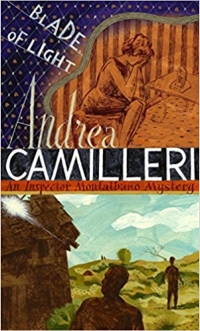|
"...not a single
one of the Montalbano stories was written without a specific prompting, I am
tempted to say. Writing just for the sake of writing is not my sort of thing. I
would even say I'm incapable of it."
(Camilleri, preface,
'Montalbano's First Case & Other Stories, 2008/16)
Perhaps, like the
protagonist in Borges' celebrated story
The
Circular Ruins (1940), Camilleri thinks he's just one in an infinite chain
of dreamers who, in this case, instead of dreaming new dreamers into existence,
dreams novels endlessly.
With writers like
this, it gets difficult to tell when their imaginations have run dry or when
they've actually advanced the narrative. Is Camilleri like this? Maybe by the
fifteenth or sixteenth Montalbano mystery you're thinking this cop should die,
go out in a blaze of mafiosi bullets or succumb to food poisoning at his
favorite trattoria, Enzo's, or maybe get knifed by his long suffering lover
Livia or one of the many femme fatales he investigates a little too
personally in person.
'the earth smelled
as good as the sea'
Blade of Light (2012)
is a bit like this, seeds the veteran Montalbano reader with doubt. The deja
vu seems stultifying at times, and you wonder if you can make it to the
end, even though the writing is the usual easy read, as loose as silver in the
pocket. Once again -- for anyone who has read the earlier novels in the series
-- it starts with Montalbano dreaming, this time of a coffin in an open field.
Ah yes, his mystic
Sicilian surrealism gambit, where events are foreseen by the great detective as
if he's tapped into the ancient oracles of the nearby Valley of the Temples.
Well, it's an attractive method, sure enough, unless you're thinking Camilleri
has used this old trick one too many times, and do I care who is in the coffin?
In his dream, it's the Commissioner Bonetti-Alderighi, his immediate superior
and tormentor... it's funny, although you suspect that if a coffin should be
found, it won't be the Commissioner's.
A farmer called
Intelisano comes in to the station to report that someone unknown has installed
a padlocked door on an abandoned cottage on one of his properties. So the dream
farce is set aside for the moment as Montalbano investigates the mystery of the
padlocked door and a couple of Tunisian farm labourers who really don't look
like manual workers at all, who just might be into smuggling some heavy weapons
back to the rebels in the old country. Montalbano assumes a light disguise --
hat, shades, a convivial manner -- approaches the ruined house, sees a flash of
light from the loft (the poetic "blade of light" that provides the title),
suspects he's under surveillance by someone using binoculars.
But this is really a
job for the anti-terrorism unit. The other crime is more his speed -- the rape
and robbery of a young married woman late at night when delivering the day's
cash from her husband's supermart to a deposit box on a deserted midnight
street. So, when is Montalbano dreaming, when is he not? All these women and
their tricks. Montalbano has a few tricks of his own, of course, and while he's
well-known from the crime-beat interviews on local television, and is therefore
a local celebrity, women should be wary. While not exactly a one-night stand
artist, Montalbano has a polite way of shucking his women like fish bones or
crimes solved and filed.
And who is the woman
here? Marian, an art gallery maven who pounces on Montalbano like cat finding a
warm stone to lie beside. Of course his main throb Livia is giving him a hard
time. And as usual she's way up there in Genoa suffering from some sort of
depression that's more like a guilt trip ploy, something to make Montalbano
move or get off the pot... yet turns out to be a premonition of nasty things to
come. So there are forces at work here that subjugate any crimes of fidelity,
robbery, murder, and conspiracy, and all of these things are going on in Blade
of Light.
Just what is a "blade
of light"? you ask. A forced poeticism? Another edition goes by the title 'A
Beam of Light', a more ordinary figure (perhaps you'd call it a dead metaphor).
'Blade" is better. When you reach the ending, and reflect on what has happened,
the irony of this figure is bitter sweet -- bitter for Montalbano, sweet for
the reader (who is, of course, a connoisseur of Camilleri's Sicilian epic).
Guilt, revulsion, irresponsibility. It's quite the pivot, a piece of dark
psychology that perhaps doesn't leave Montalbano in the best light. You do need
to know something of Montalbano's history from the earlier novels -- especially
The Snack Thief (number 3) -- to understand absolutely what has gone down,
although the author does insert some history to help finesse the moment.
Nest of Vipers...
Montalbano's First Case... Pyramid of Mud... 20, 21, 22...
© LR June
2017
*Check out LR's
OUTLAW
ACADEMIC »»
or LR's novel
RADIO
BRAZIL »»
|
